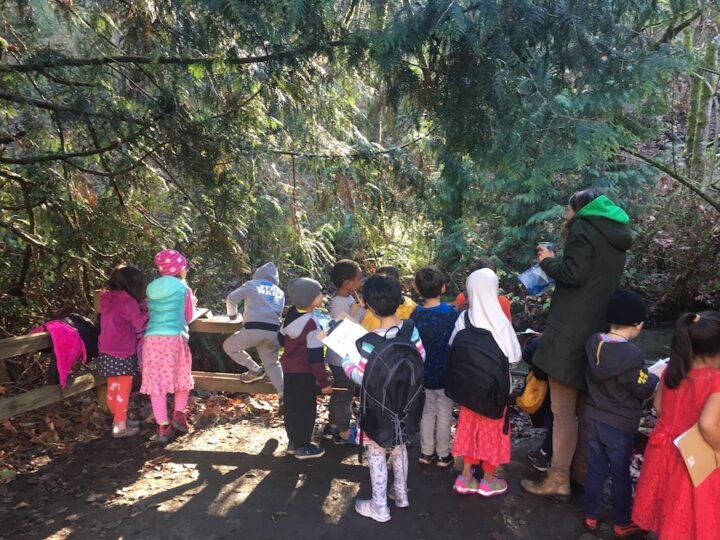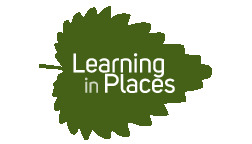Supporting observations, wonderings, systems thinking & “Should We” deliberations through Learning in Places

- Understanding and making decisions about socioecological systems have direct and indirect impacts on families, communities, and institutions. In turn, family knowledges and practices impact how we come to understand socio-ecological phenomena.
- Families and educators have key roles to play in helping develop socioecological “Should We” questions.
- Educational leaders are in a uniquely powered position to focus learning goals on complex nature-culture relations in ways that position humans as a part of the natural world.
What Is The Issue?
Science investigations often address complex, socio-ecological systems and issues. This involves considering the role of humans within larger environmental systems and deliberating on ethical questions about what actions we should take, how we impact (and are impacted by) our environment, and what responsibilities we have within the natural world. New resources from the Learning in Places project support classrooms, families, and educators to think about these questions through walking, observing, questioning, and wondering in places, using their identities and cultural ways of knowing to ask and deliberate on questions from multiple perspectives.
Authors:
BY JORDAN SHERRY-WAGNER, PRIYA PUGH, CHRISTINA GUEVARA, ABBY RHINEHART, MEGAN BANG & CARRIE TZOU; EDITED BY: PHILIP BELL | DECEMBER 2021
Reflection Questions
- How does thinking about and exploring socioecological sensemaking through field-based science practices build upon learning that happens at your school/institution?
- How can you work toward more ethical teaching and dignified learning in your own educational context via learners’ and families’ observations, questions, and wonderings?
Things to Consider
- Scientific literacy involves systems thinking, including understanding the roles of humans within complex systems. Systems thinking may involve complex concepts, but it can be done by learners of all ages.
- Starting with observation, wondering, and questioning in places is a powerful way to connect learning to places and student interest. Science inquiry that emerges from students’ and families’ observations and wonderings can lead to equitable science learning that impacts not only students, but community well-being.
- Sensemaking through ”Should We” questions requires learners to speculate from multiple perspectives, explore relationships between humans and the rest of the natural world, and consider the impact of power and historicity to deliberate and make more ethical and accountable decisions within natural and social worlds.
- Walking and wondering from a systems level is an opportunity to consider relationships and responsibilities within environmental systems, including our responsibilities to more-than-human species and the impact of our environments on our health and families.
- Within the Learning in Places Seasonal Storylines (classroom, family, and garden), learner wonderings and group “Should We” questions produce investigation questions. Investigations questions require systematic observation and other field-based science methods to model relationships and collect/analyze data to inform ethical “Should We” deliberations.
Attending to Equity
- Relationships between people and the rest of the natural world vary by culture and context. Science activities can be an opportunity to rethink schooling to center non-dominant students’ family and community expertise and on building relationships with families for science learning.
- Walks should prioritize socio-emotional and physical needs while learning with places. A short walk, or even a series of “window wonderings” offer important opportunities to observe, speculate, and deliberate on socioecological relationships.
- Starting inquiry with students’ observation and wonderings signals their role as authentic co-designers of group activity. This is an important step toward fostering educational dignity grounded in active listening, and intergenerational collaboration.
Recommended Actions You Can Take
- Read and design with these Learning in Places Frameworks:
- To learn more about how human communities have always made socio-ecological decisions shaped by values: Ethical Deliberation and Decision Making
- To consider the importance of starting with learner observation and wonderings: Wonderings, “Should We”, & Investigation Questions
- To think about relationships within a system: Relationships; What “Should We” Do?
- To think across scales of time and/or space: Thinking Across Scales; Socio-Ecological Histories of Place Walk
- To explore human impacts and responsibilities within your local socio-ecological system and think more about possible futures for your area: Places, Lands, and Waters; Human Decision Making
- Explore the ideas and practices in the other STEM Teaching Tool on Learning in Places resources, “Building Family-Centered Models for Science Learning through Learning in Places.”
ALSO SEE STEM TEACHING TOOLS
- #10 Indigenous STEM
- #20 Learning Outdoors
- #31 Community Expertise
- #57 Place-Based Learning
- #61 Socio-Ecological Caring
- #71 Equity Projects
STEM Teaching Tools content copyright 2014-22 UW Institute for Science + Math Education. All rights reserved.
This site is primarily funded by the National Science Foundation (NSF) through Award #1920249 (previously through Awards #1238253 and #1854059). Opinions expressed are not those of any funding agency.
Work is licensed under a Creative Commons Attribution-ShareAlike 4.0 Unported License. Others may adapt with attribution. Funded by the National Science Foundation (NSF). Opinions expressed are not those of any funding agency.


 Email Feedback
Email Feedback


